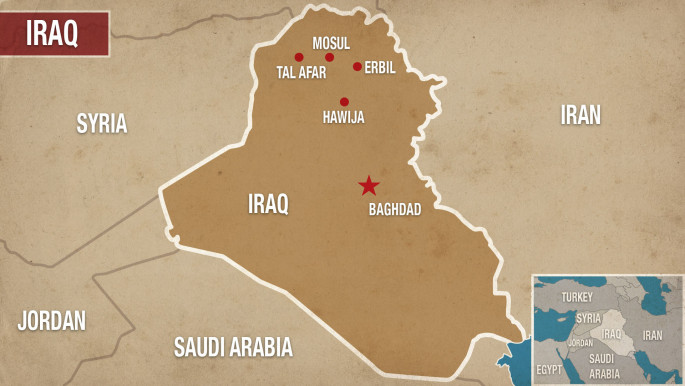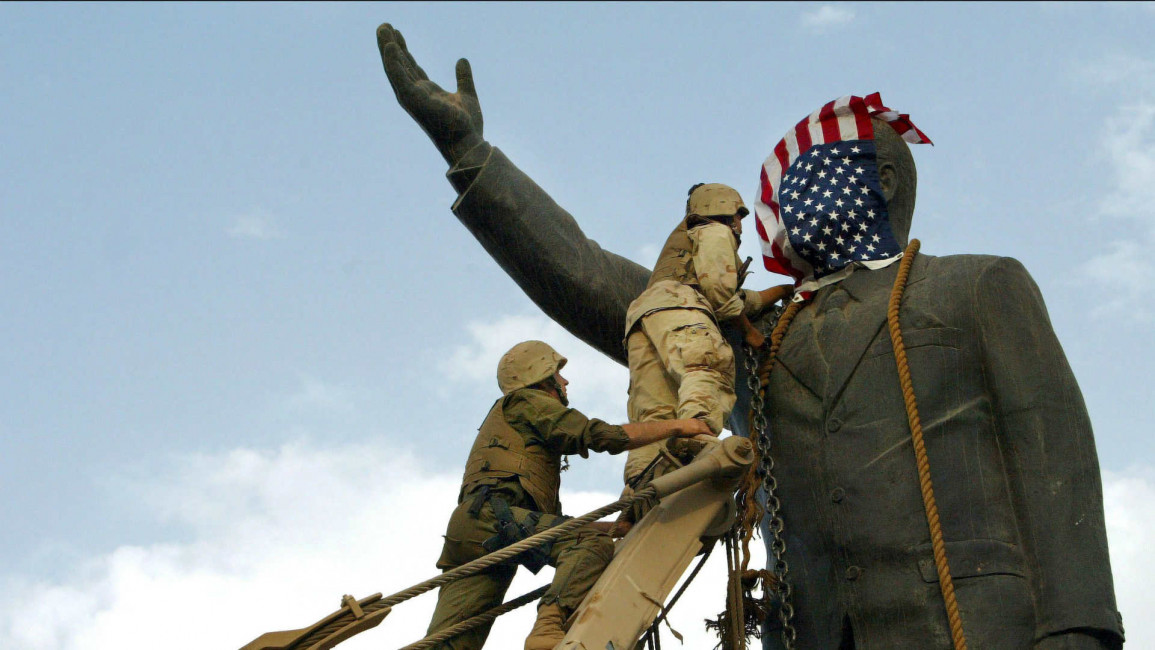
Operation Iraqi Freedom: The death of an army
As the fog of war settled, startling transformations took shape under the famous Bremer edicts, starting with the lustration of Iraq's security institutions, disbanded by Coalition Provisional Authority (CPA) chief, Paul Bremer.
Written into history as one of the worst acts of colonial design, its legacy continues to shape America's foreign policy.
Recruits, especially high-ranking lieutenants and colonels, were written out of the new Iraq, portrayed as Saddam loyalists or Ba'ath affiliates.
What remains in question is whether this successfully reformed Iraq's once centralised conventional army, or whether an assortment of militias granted official status two years ago have replaced the military in Iraq.
From the outset, occupational aims the United States Department of Defense discussed in 2003 appear muddled. Military reform was emphasised above the disbandment of Iraq's security forces. However, should reform fail due to high-defection rates, the mammoth task of building a new army governed by security institutions expunged of Baathists, would - they said - offer a fallback plan.
But reform was less convincing to others. In an opinion piece for The Washington Post published in November 2003, Coalition Provisional Authority in Baghdad advisor, Walter B. Slocombe described the effort to "convert an army that was a principle tool of his [Saddam Hussein's] oppressive system into the armed guardian of a new democracy" a "mistake".
It was not long before the democracy America promised was strangled at birth, to use the words of Iraqi novelist and activist Haifa Zangana.
 |
A decade later, Iraq's poorly reconstituted army melted away, never to be reactivated |  |
Iraq's army was a bite too sizeable for the CPA's institutional engineers. The flawed wisdom of De-Baathification spun the country into a militant breeding ground, with American forces helpless in stemming the tide of foreign fighters from neighbouring Iran, funnelling into Iraq.
America's unpreparedness was similarly underlined by the Iraqi army's act of self-disbandment planned for by the former regime - mirroring America's score-settling purge and giving life to a Chimera insurgency. "There was no intact Iraqi force to disband", Slocombe conceded in later months.
The void that America's 10 commandments tore open gave way to militia structures. The sovereignty the Iraqi governing council assumed on 1 June 2004 did little to reverse US losses. The first infantry battalions of the new army completed their training at a similar time, but absent without leave rates rose into double figures.
Read more: Islamic State families struggle with life after the 'caliphate'
America's solution to cut losses and costs was the formation of the Multi-National Force (MNF-I) which in May 2004 was charged with conducting military operations nationwide.
Rushed training and a lack of expertise meant they were ill-prepared and loyalty, as rates documented by United States General Accounting Office show, was one ingredient occupational architects lacked.
Desertion was most prevalent between April 2 - 16, when up to 12,000 soldiers drafted into the Iraqi Civil Defense Corps "did not show up for duty".
Unable to handle weight of these tasks alone, US-trained Iraqi units and their occupiers fought shoulder to shoulder, as violence devolved from the Baath to the nascent Iraqi state.
 |
Liberation was merely a bridge that has helped militia commanders cross into the legitimate realm of politics |  |
Defections and episodes of collapse remained common, but drew to halt during the 2005 Iraqi elections, claimed former CIA director, David Petraeus.
But other US figures predicted the nightmare of collapse that withdrawal made likelier.
Warnings were ignored and a decade later, Iraq's poorly reconstituted army melted away, never to be reactivated, as the Islamic State (IS) unleashed the toughest urban warfare phase in the history of the new Iraq.
Looking back, these mistakes are easily identifiable, but the revival of militias mobilised 15 years ago to fight coalition forces, also deserves attention.
The black hole IS' blitzkrieg opened was not enough to prompt any kind of response from the Iraqi state, leaving religious leaders to intervene. Revered Ayatollah Ali al Sistani was forced to step in, issuing an edict urging men to defend their nation and shrines.
 |
|
| Iraqi PMF fighters June 20, 2017 on the Iraq-Syria border in Nineveh, Iraq, push IS back into Syria [Getty] |
Heeding his call, thousands registered at makeshift recruitment centres, committed to defeating the terrorist network.
What few analysts note is the wording of Sistani's ruling, that was empty of pronouncements determining the organisation's shelf life, or endorsements of a parallel force that has undermined the rebirth of Iraq's conventional army.
Against what was instructed, recruits were not integrated into existing security institutions, but stood apart.
A new umbrella paramilitary organisation swelled into action - the Popular Mobilisation Units (PMU), referred to locally as al-Hashd al-Shaabi - scoring an extraordinary tally of victories against the Islamic State group since their genesis in June 2014, with significant aerial cover from the United States.
 |
|
| [Click to enlarge] |
Their growing archive of war crimes however, documented during 'liberation' operations, has been ignored to facilitate climbing the ladder of politics and entry into the electoral race.
As noted by rights group Amnesty International in January last year, PMU units "have extrajudicially executed, tortured and abducted thousands of men and boys". The conduct of commanders and their venomous hate-inciting rhetoric remains ignored. Without access to Iraq's poisonous media landscape, these facts surpass most observers.
Having reached the top of Baghdad's political process, the power they desired was not short-term but permanent, with sponsorship from Baghdad and Tehran's mullahs.
Liberation was merely a bridge that has helped militia commanders cross into the legitimate realm of politics. The decentralised military structure which loosely frames anywhere between 60 to 80 militia outfits has eclipsed the central army due to arms proliferation, and a chain of disastrous Dawa linked administrations; Jaafari's, Maliki's and Abadi's - though to a lesser extent - that have governed Iraq.
 |
Billions of US dollars have been squandered on the professionalisation of non-state actors |  |
The group's official status came on 26 November 2016, after parliament passed a law which Sunni lawmakers and Iraq's exiled political class vehemently opposed, transforming the overwhelmingly Shia force into a legally recognised military corps.
The official stamp this afforded the consortium of largely Iran-backed militia marks the reversal of military professionalism, and the death of Iraq's national army.
Iraq's PMU is one of a handful of actors Iran has nurtured; ideologically, militarily and logistically; indirect representatives whose true allegiance is draped in nationalistic platitudes.
Billions of US dollars have been squandered on the professionalisation of non-state actors that with Iranian arms and US weaponry and armoury in their grasp, have replaced traditional military institutions and carved out an important seat for IRGC commander Qassem Soleimani.
Iraq's largest state institutions - interior and defense - are managed by Iran friendly figures, particularly for Qassim al-Araji whose loyalty for fighting on the side of Iran during the Iran-Iraq 80s war was rewarded in January 2017 when he assumed office as Iraqi defense minister.
Last October congressional member Ted Poe told Congress that "Tehran's sectarian influence… poisoned Iraq's fledgling democracy" arguing that "its thugs are not ten feet tall" but "armed mobs [that] have gone unchallenged". Poe is not wrong, but the too little-too late mantra comes to mind when considering the opportunities America squandered to trim Iranian influence in its backyard when it took control of Iraq 15 years ago.
Few care to speak of mounting frustration among Iraq's PMF commanders, whose personal interests have at times fallen out sync with their patrons.
 |
As America draws back support, militias have no lap other than Iran's in which to fall |  |
Recurrent spats over the ownership of defeat against the Islamic State Group, Iran's control of Iraq and the decision to execute Saddam, indicate fissures - a purview of future controversies perhaps.
As America draws back support, militias have no lap other than Iran's in which to fall. The much delayed passing of Iraq's 2018 budget sparked renewed audacity by PMU commanders, claiming that this year's allocated budgetary funds barely stretch to cover the PMF institutional costs.
The prime minister's carousel of promises to demobilise and disarm the PMU is causing nationwide disgust, and forcing more of Iraq's young people to flee militarised life at home.
The once shallow roots of militia bands have now grown thick and long, and Iran-friendly figures now populate Iraq's institutional landscape and economic sectors, as far as Mosul and Kirkuk.
Fear of unsettling or upsetting PMF ranks has seen Iraqi officials confine themselves to the margins, simply to ensure survival.
The sinking ship Iraq has become will not be saved with more weapons pouring into the country.
The outcome of Iraq's upcoming elections in May will therefore determine the future chapters of the country's military history. A former militia leader may be elected prime minister potentially recharging IS' ability to sabotage and disrupt the political landscape with renewed brutality.
Nazli Tarzi is a freelance British-Iraqi journalist, specialising in Middle East politics, with a particular interest in Iraqi affairs.
Follow her on Twitter @NazliTarzi
Opinions expressed in this article remain those of the author and do not necessarily represent those of The New Arab, its editorial board or staff.



